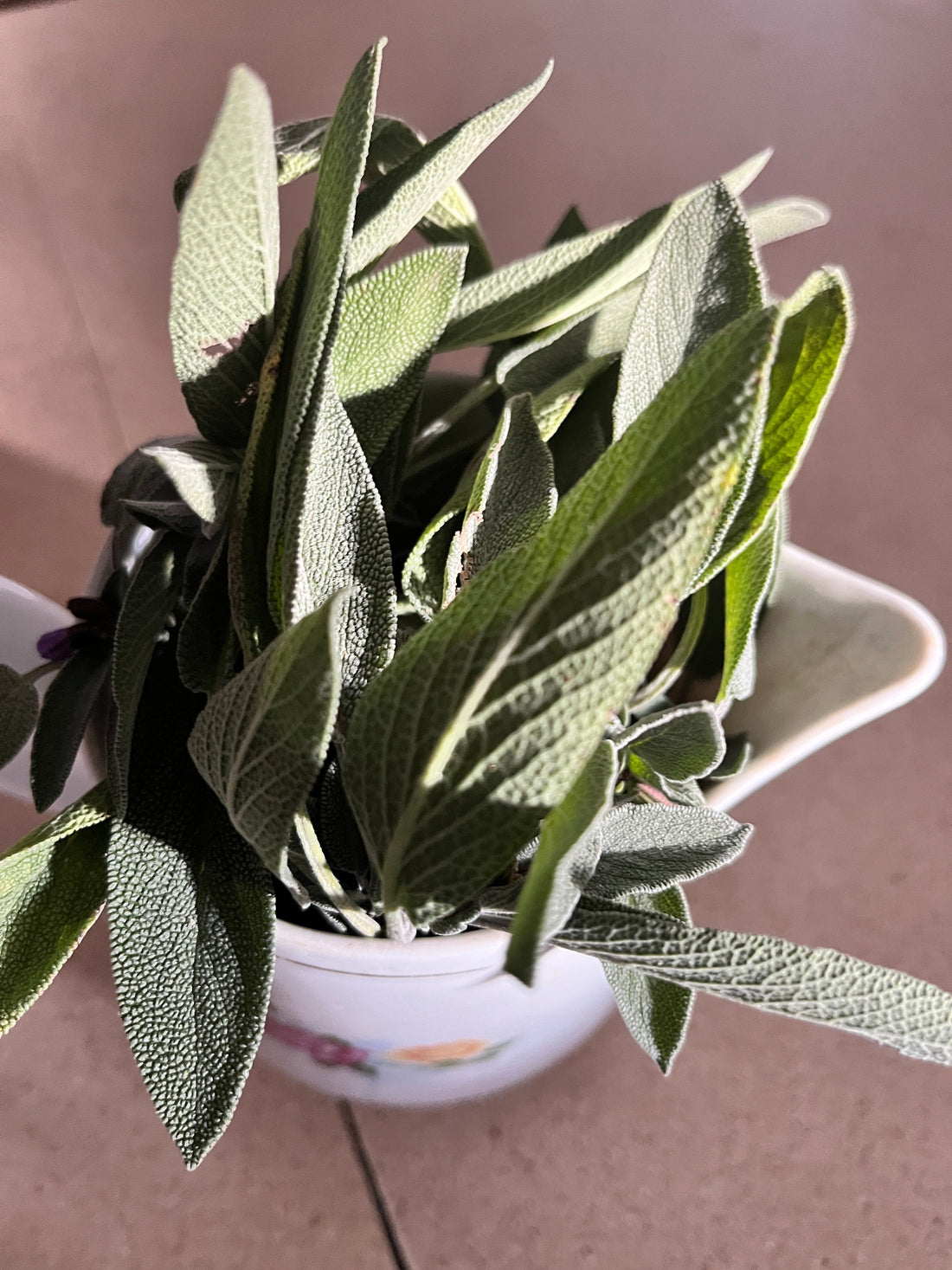
The Sages Use Sage. Epic for whole body wellness
Share
Sage (Salvia officinalis) is a perennial herb steeped in centuries of reverence, both as a culinary staple and a medicinal ally. Native to the sun-drenched hillsides of the Mediterranean, particularly Southern Europe, sage thrives in well-drained, alkaline soils and basks in full sunlight. It’s drought-tolerant but sensitive to cold, preferring temperate climates where it can flourish year-round.
Though its roots are Mediterranean, sage has been naturalized across the globe—from cottage gardens in England to herbal plots in Australia—wherever herbalists and cooks seek its aromatic leaves and healing touch.
The name Salvia comes from the Latin salvare, meaning “to save” or “to heal,” a nod to its ancient reputation as a panacea. In medieval Europe, sage was considered so potent that the School of Salerno famously wrote, “Why should a man die while sage grows in his garden?” This poetic reverence mirrors its modern applications: sage is used to support cognitive clarity, soothe respiratory ailments, and balance hormonal fluctuations. Though not a classic adaptogen, sage exhibits adaptogenic-like qualities by modulating the nervous and endocrine systems, especially during times of stress or transition.
Medicinally, sage is cooling and drying—ideal for dispelling heat and dampness in the body. It’s a trusted remedy for coughs, colds, and flus, thanks to its antimicrobial, anti-inflammatory, and astringent properties. A warm infusion or gargle can ease sore throats and tighten mucous membranes, while its essential oils help clear congestion and fight infection. Sage also shines in hormonal support, particularly for menopausal symptoms like hot flashes and mood swings. Its gentle estrogenic activity makes it a valuable herb for women navigating hormonal shifts.
Cognitively, sage is a symbol of wisdom and mental clarity. Modern research supports its traditional use for memory enhancement and neuroprotection, with promising results in early studies on Alzheimer’s disease. Spiritually, sage is used in smudging rituals to clear energetic stagnation and invite clarity—a practice that echoes its physiological effects on the mind.
In the kitchen, sage’s earthy, slightly peppery flavour pairs beautifully with root vegetables, legumes, and plant-based proteins. Its grounding nature complements its medicinal gifts, making it a staple in both healing and culinary traditions. Whether brewed as tea, tinctured for concentrated use, or bundled into smudge sticks, sage continues to be a botanical bridge between body, mind, and spirit.
Taking Salvia officinalis (sage) as a herbal extraction—whether as a tincture, fluid extract, offers a potent and versatile way to access its therapeutic benefits. Here's what sage extract can support:
Cognitive Function & Mental Clarity
Sage extract has shown promise in enhancing memory, learning, and information processing. Clinical studies suggest it may improve symptoms in people with mild to moderate Alzheimer’s disease by supporting neurotransmitter activity and reducing oxidative stress. It’s often used by herbalists to sharpen focus and clear mental fog.
Hormonal Balance & Menopausal Support
Sage extract is particularly helpful during menopause. It can reduce hot flashes, night sweats, and sleep disturbances, thanks to its gentle estrogen modulating effects. This makes it a valuable ally for women navigating hormonal transitions.
Respiratory & Immune Health
Its antimicrobial and anti-inflammatory properties make sage extract effective for sore throats, coughs, and oral infections. It’s often used in herbal mouthwashes or gargles to combat bacteria like Streptococcus mutans, which contributes to dental plaque and cavities.
Digestive & Metabolic Support
Sage extract may help regulate blood sugar, cholesterol, and appetite, making it useful in managing metabolic conditions like diabetes and obesity. It also supports digestion by calming spasms and reducing bloating.
Skin & Anti-Aging Benefits
Applied topically or taken internally, sage extract can help reduce inflammation, redness, and signs of aging. It’s rich in antioxidants like rosmarinic acid, which protect skin cells from UV damage and oxidative stress.
Please chat with us if you want some sage in your herbal formulation as we are happy to add this beautiful herb into your life. You can also get many therapeutic benefits from drinking sage tea.

Here I am at Eumundi Markets last Saturday.
We did a little socials clip on herbs that help with appetite suppression for weight loss. I'll do a blog on that soon.
Thanks for reading my newsletter and have a great day
Dominique LivKamal, ND is an award-winning naturopath, herbalist, and wellness advocate. She’s passionate about empowering you on your wellness journey.She holds a Masters degree in Public health ( Health Promotion) Bachelor Health Science ( Complementary Medicine ) is a qualified Naturopath , herbalist and nutritionist. She has three published books and is a constant student in wellness and life Dom also has a diploma in Journalism, is a qualified Kundalini yoga teacher and Zen Thai Shiatsu Therapist and yoga teacher. Dominique is founder and naturopath at Medicine Room. She has developed the herbal manufacturing processes here for herbal extractions and has been offering free community clinics to her clients since 2004.
Thanks so much. We appreciate if you want to give us a Google review to help more people learn about us and benefit from our herbal products and clinics.
